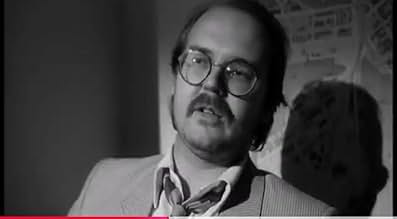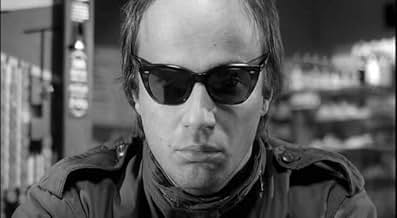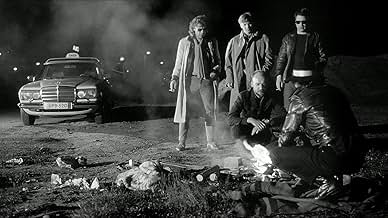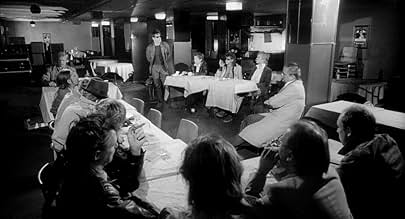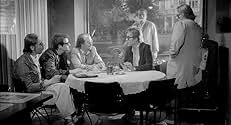AVALIAÇÃO DA IMDb
6,9/10
4,3 mil
SUA AVALIAÇÃO
Adicionar um enredo no seu idiomaAn exodus to a better life in Eira. A group of med - all but one - called Frank, seek refuge from their boring lives in an oasis on the other side of the city, having to overcome obstacles o... Ler tudoAn exodus to a better life in Eira. A group of med - all but one - called Frank, seek refuge from their boring lives in an oasis on the other side of the city, having to overcome obstacles on their way.An exodus to a better life in Eira. A group of med - all but one - called Frank, seek refuge from their boring lives in an oasis on the other side of the city, having to overcome obstacles on their way.
Sakari Kuosmanen
- Frank Armoton
- (as Saku Kuosmanen)
Tuomari Nurmio
- Taksikuski
- (as Hannu Nurmio)
Avaliações em destaque
Aki's second personal feature film has a prototype of the late style, but it is not particularly clear. After thinking about it, I can't find a particularly accurate language to summarize the theme of the film. It seems that it can also make a psychological interpretation. It can even be said to be a cool "Finnish version of mind agents"? Everyone's name is frank, but everyone seems not to be frank. The ideal country they are looking for seems to be illusory. Maybe a lot of music is what AKI really wants to present.
This film, from the beginning of Kaurismäki's career, reminded me, to a certain extent, of another iconic film about the lost illusions of the 60s and 70s generations, The Wretches Are Still Singing, by the Greek Nikos Nikolaidis.
Of course, Nikolaidis's cinematic language is much more caustic and corrosive. Kaurismäki is faithful to his minimalist principles, as a poet of the absurd. But the essential theme is the same: a lost generation, overtaken by events, that searches, in vain, for a meaning in life in the technocracy that emerged from the rubble of the revolution (real or imaginary).
If Nikolaidis is destructive (and he would be even more so in 1983's Sweet Bunch, in which he practically defends urban guerrilla warfare) Kaurismäki is poetic, transforming disillusionment into a chimerical search for the mythical Eira, Holy Grail of aimless knights, survivors of punk nihilism.
An interesting and original work, even for those who already know Kaurismäki's minimal cinematographic language.
Of course, Nikolaidis's cinematic language is much more caustic and corrosive. Kaurismäki is faithful to his minimalist principles, as a poet of the absurd. But the essential theme is the same: a lost generation, overtaken by events, that searches, in vain, for a meaning in life in the technocracy that emerged from the rubble of the revolution (real or imaginary).
If Nikolaidis is destructive (and he would be even more so in 1983's Sweet Bunch, in which he practically defends urban guerrilla warfare) Kaurismäki is poetic, transforming disillusionment into a chimerical search for the mythical Eira, Holy Grail of aimless knights, survivors of punk nihilism.
An interesting and original work, even for those who already know Kaurismäki's minimal cinematographic language.
Kaurismaki followed on the dour and heavy drama of his debut Crime and Punishment with the often funny, significantly more light-hearted, absurdist fare of Calamari Union. Fifteen guys named Frank and their retarded companion Pekka (who speaks English for some reason) decide to leave their seedy downtown neighborhood and dead-end lives behind and move to the suburb of Eira, on the other side of the city. Eira immediately acquires a quasi-mythic status, equal parts promised land and elysian fields, and their trip through the hostile, soulless city landscape is beset with hardships worthy to a trip filled with such religious allegories.
There's not much of a plot to speak of. The Franks make their way through the city and is every man out for himself. Once in a while they stop to comment on their surroundings, sleep in phone booths, trees and other strange places, offer nuggets of wisdom about vanity, inactivity, time and age, part scathing social critique and part insights into human nature; they also stop to hijack members of the parliament, a hearse, get free rides in a taxi or on top of a car, sleep in a beach or under a table and last but not least, die funny or just plain random deaths.
That is Calamari Union in a nutshell and there lie both its charms and failures. It has the improvised feeling of a freejazz piece - like them, sometimes it works, sometimes it doesn't. It can be inspired, infectiously cool and funny but it can also be meandering and aimless. You take the good with the bad I guess.
There's not much of a plot to speak of. The Franks make their way through the city and is every man out for himself. Once in a while they stop to comment on their surroundings, sleep in phone booths, trees and other strange places, offer nuggets of wisdom about vanity, inactivity, time and age, part scathing social critique and part insights into human nature; they also stop to hijack members of the parliament, a hearse, get free rides in a taxi or on top of a car, sleep in a beach or under a table and last but not least, die funny or just plain random deaths.
That is Calamari Union in a nutshell and there lie both its charms and failures. It has the improvised feeling of a freejazz piece - like them, sometimes it works, sometimes it doesn't. It can be inspired, infectiously cool and funny but it can also be meandering and aimless. You take the good with the bad I guess.
Following up a successful first movie can be a difficult struggle; Kaurismäki deflected it after "Crime And Punishment" by quickly doing this one, completely different and very funny. We're treated to a number of Finnish derelicts and lower-class guys in a poor suburb of Helsinki, as they decide to mount an expedition to reach the Mayfair of the city (just get there, that is). You'll immediately notice that they talk of this as if there lay a strange and superhuman challenge in just reaching the place. As their trials begin, we realize that maybe Helsinki _is_ a really dangerous city.
The film is full of scenes of weird comedy and pinpoint satire, and as an extra accent every one of the men is called Frank, except one. The film really rocks, and you'll keep wondering what happens next.
The film is full of scenes of weird comedy and pinpoint satire, and as an extra accent every one of the men is called Frank, except one. The film really rocks, and you'll keep wondering what happens next.
A homage to acclaimed 1979 Walter Hill film "The Warriors",(it even features a subway car), done in Kaurismäki peculiar, Godard inspired style, "Calamari Union" shows a group of uniformed named man, as opposed to uniforms of gang colors, fighting their way through Helsinki, trying to get to the promised neighborhood of Eira, not their native, but wishful place of living, where "there are no apartments". Along the way they meet and befall casualties to all sorts of transient enemies, asking for trouble as they go along. Their journey is futile, an attempt to overcome nonexistent and unseen boundaries, doomed from the start. Their resolve is even questionable and strong willed women are often derailing them from their unsure path, as the obstacles appear before them as a mirage.
Shot in typical Kaurismäki minimalist style, black & white photography, improvised dialog on a loosely based script, "Calamari Union", succeeds in bringing a viewer close to chaotic nature of the group's quest. This film is definitely worth repeated viewings, just for substance and style. Recommended.
Shot in typical Kaurismäki minimalist style, black & white photography, improvised dialog on a loosely based script, "Calamari Union", succeeds in bringing a viewer close to chaotic nature of the group's quest. This film is definitely worth repeated viewings, just for substance and style. Recommended.
Você sabia?
- CuriosidadesThe first movie ever to include scenes in the Helsinki underground, opened in 1982.
- Erros de gravaçãoThe Director is seen in reflection of Frank's (Sakke Järvenpää) sunglasses in "My friend got sick, can you help us" scene.
- Cenas durante ou pós-créditosThe film has virtually no credits at all. There are no opening credits, and in the end, only the text "Loppu" and the production company's name are seen.
- Versões alternativasAll the scenes are intact, but the title card and opening credits are missing from the 2013 (1.85:1) HD master, which is featured in the Finnish streaming service Yle Areena and subsequent Finnish/international television, DVD and Blu-ray releases. The credits originally appear during the early scenes where the "Frank's" initially leave, walk out and past the Kallio Church (followed by a wider shot of the city of Helsinki) and enter the underground metro station. All credits are intact in the older, pre-2013 television airings and home video releases.
- ConexõesFeatured in Keskiyön auringon kuvat (1987)
- Trilhas sonorasAlkutekstimusiikki
Composed by Aki Kaurismäki
Arranged by Mikko Mattila and Jone Takamäki
Performed by Casablanca Vox and Jone Takamäki
Saxophone: Jone Takamäki
Drums: Kaleva Raittinen
Principais escolhas
Faça login para avaliar e ver a lista de recomendações personalizadas
- How long is Calamari Union?Fornecido pela Alexa
Detalhes
- Tempo de duração1 hora 21 minutos
- Cor
- Mixagem de som
- Proporção
- 1.66 : 1
Contribua para esta página
Sugerir uma alteração ou adicionar conteúdo ausente

Principal brecha
By what name was Calamari Union (1985) officially released in India in English?
Responda


